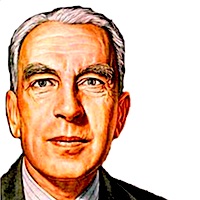

Tao Te Ching

Arnold Toynbee
1889 – 1975 CE
Philosopher of history, international affairs expert, research professor, and prolific author; Toynbee was the the world’s most translated, read, and discussed scholar for much of the 20th century. He wrote hundreds of books and articles translated into more than 30 languages. Applying his insights from studying history to modern political problems, he became a delegate to the 1919 Paris Peace Conference, worked in the British Foreign Intelligence Office, and held a long-term position at the London School of Economics. His historical studies led to persuasive theories about how civilizations arise as a response to extreme challenges by "creative minorities" and how these solutions change the course of cultural evolution. Believing that civilizations most often die from suicide rather than invasion or natural causes, he describes the process of how civil-success leads the people and leaders to a kind of complacency full of nationalism, militarism, and oppressive tyranny.
Eras
Western
Post-Romantic Age (1850 – 2018 CE)Great Depression (1929 – 1941 CE)
Roaring Twenties (1920 – 1929 CE)
Chinese
Qing dynasty (1644 – 1912 CE)Generations
The Lost Generation (1883 – 1900 CE)Sources
Unlisted Sources
An Historian's Approach to Religion (1956)
Quotes by Arnold Toynbee (13 quotes)
“Man achieves civilization, not as a result of superior biological endowment or geographical environment, but as a response to a challenge in a situation of special difficulty which rouses him to make a hitherto unprecedented effort.”
from A Study of History
Comments: Click to comment
“Man achieves civilization, not as a result of superior biological endowment or geographical environment, but as a response to a challenge in a situation of special difficulty which rouses him to make a hitherto unprecedented effort.”
from A Study of History
Comments: Click to comment
“This is a hard saying for adherents of the higher religions of the Judaic family (Judaism, Christianity, and Islam), but it is a truism for Hindus. The spirit of mutual good-will, esteem, and veritable love ... is the traditional spirit of the religions of the Indian family. This is one of India’s gifts to the world.”
from A Study of History
Comments: Click to comment
“Tracing the Islamic society bak to its origins, we find that it is itself a fusion of two originally distinct societies: the Iranic and the Arabic… both originating from an extinct society, the Syriac.”
from A Study of History
Comments: Click to comment
“It is difficult rather than easy conditions that produce achievements… where life was easy, natives remained primitive… the harder a time a country has had, the more brilliant its record as an originator of civilization.”
from A Study of History
Comments: Click to comment
“Dante did not accomplish his life-work until he had been driven to withdraw from his native city... in losing his birthright in Florence, Dante was to win the citizenship of the world; for in exile the genius which had been crossed in politics after being crossed in love found its life-work in creating the Divina Commedia.”
from A Study of History
Comments: Click to comment
“Machiavelli was able to return to the world on a more etherial plane, on which his effect on the world has been vastly greater... he succeeded in transmuting his practical energies into a series of mighty intellectual works which have been the seeds of our modern, Western political philosophy.”
from A Study of History
Comments: Click to comment
“Vulgar hedonists took in vain, and brought into disrepute, the name of Epicurus, and for this offence were chided by the austere Epicurean poet, Lucretius.”
from A Study of History
Comments: Click to comment
“This active psychological catastrophe in three acts was the commonest theme—the story of Ajax in Sophocles’ play… the condition of being spoiled by success, the consequent loss of mental and moral balance, and the blind headstrong, ungovernable impulse which sweeps an unbalanced soul into attempting the impossible.”
from A Study of History
Comments: Click to comment
“Another and earlier form of this reversion to barbarism in the West was Rousseau's gospel of the 'return to nature' and the exaltation of 'the noble savage'... The fundamental gospel of archaism was condensed into a sentence, the opening of Rousseau's Social Contract: 'Man is born free and everywhere he is in chains.' Rousseau's most famous disciple was Robespierre, principal author of the french 'Reign of Terror.' ... This idealizing of the primitive pagan 'Nordic' race cannot entirely disclaim responsibility for the Nazi terror”
from A Study of History
Comments: Click to comment
“This burst of spiritual activity... the Confucian humanism of the 5th century BCE... was ephemeral. It degenerated from a study of human nature into a system of ritualized etiquette. In the administrative sphere it became a tradition that every administrative act required the sanction of historical precedent.”
from A Study of History
Comments: Click to comment
“The Mahometans, according to the principles of their faith, are under an obligation to use violence for the purpose of bringing other religions to ruin; yet they have been tolerating other religions for some centuries. The Christians have not been given orders to do anything but preach and instruct; yet they have been exterminating by fire and sword all those who are not of their religion... Christians enjoy the fine advantage of being far better versed than they are in the art of killing, bombarding, and exterminating the Human Race.”
from An Historian's Approach to Religion (1956)
Comments: Click to comment
“Zarathustra—who never claimed for himself to be more than a man—was transfigured retrospectively by his followers when they had come to believe that from Zarathustra's seed a superhuman savior, the Saoshyant, was to be begotten at the end of Time.”
from An Historian's Approach to Religion (1956)
Comments: Click to comment
Comments (0)